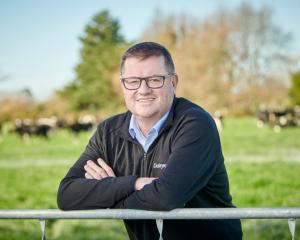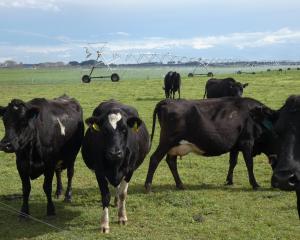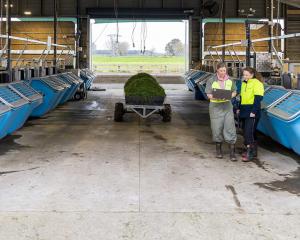
"If you want to be a dairy farmer, you’ve got to get a consent — that is your licence to farm now."
He recently replaced a clay-lined effluent pond with capacity to irrigate about 40ha.
"I wasn’t doing anything wrong — I was a good law-abiding citizen, putting effluent where it should be."
As the pond had limited storage, he was required to get a consent last year.
At an effluent facility tour at Inch Clutha last week, Mr Ferguson spoke about his new 1.5 million-litre Tasman Tank on his farm in Milton.
He kept the pond to use as a slurry pit in a bid to keep some of the solid matter out of the new effluent tank.
A consent condition, due to the slope and soil type on his farm, means effluent needs to be applied at a lower rate than before, so he installed a Cobra pump capable of meeting the condition.
"I can pump my tank out in less than 10 days."
Before a consent was necessary, he had milked cows in winter, depending on conditions. A condition of the consent meant winter milking was no longer an option.
The consent sets parameters for a farm, including cow numbers and drying off dates.
If he wanted to milk cows in winter again, he would need more effluent storage and an amended consent.
"Your consent is tailored to you and your farm."
He urged farmers to read their consent conditions carefully and to avoid including anything unnecessary or unworkable.
"Understand what you are signing in for."
The process to get a consent took a lot of time, so farmers should start the process sooner rather than later.
"There are lots of good people out there who can help you."
Obtaining a consent was possible, he said.
"You can make it through and once you’re done, you’re done."
A reason for selecting a Tasman Tank was if he changed the land-use of his farm, he could dismantle it and sell it.
Another reason was being able to walk around it and check for leaks.
A Tasman Tank did not require a consent condition for a drop test to identify if there was leakage in an effluent system, which would reduce any ongoing costs.
He had Farm Trendz technology installed, allowing him to monitor from his smartphone real-time data including his effluent storage level, the pressure level at the irrigator and effluent application.
"I’ve upgraded my whole farm system — I’m really pleased with it."
The "peace of mind" with the new effluent system was brilliant, he said.
He believed his effluent system and consent would make the farm more appealing to buyers if he put his property on the market.
ANZ South Otago relationship manager Tom Bekkers, of Dunedin, said he also considered a consent to be a "licence to farm".
If an effluent consent was required, or had expired, then the licence could be considered to be suspended by a bank.
Similar effluent consent rules were already required in Southland and Canterbury and were part of an application for finance.
"We look pretty hard at that."














